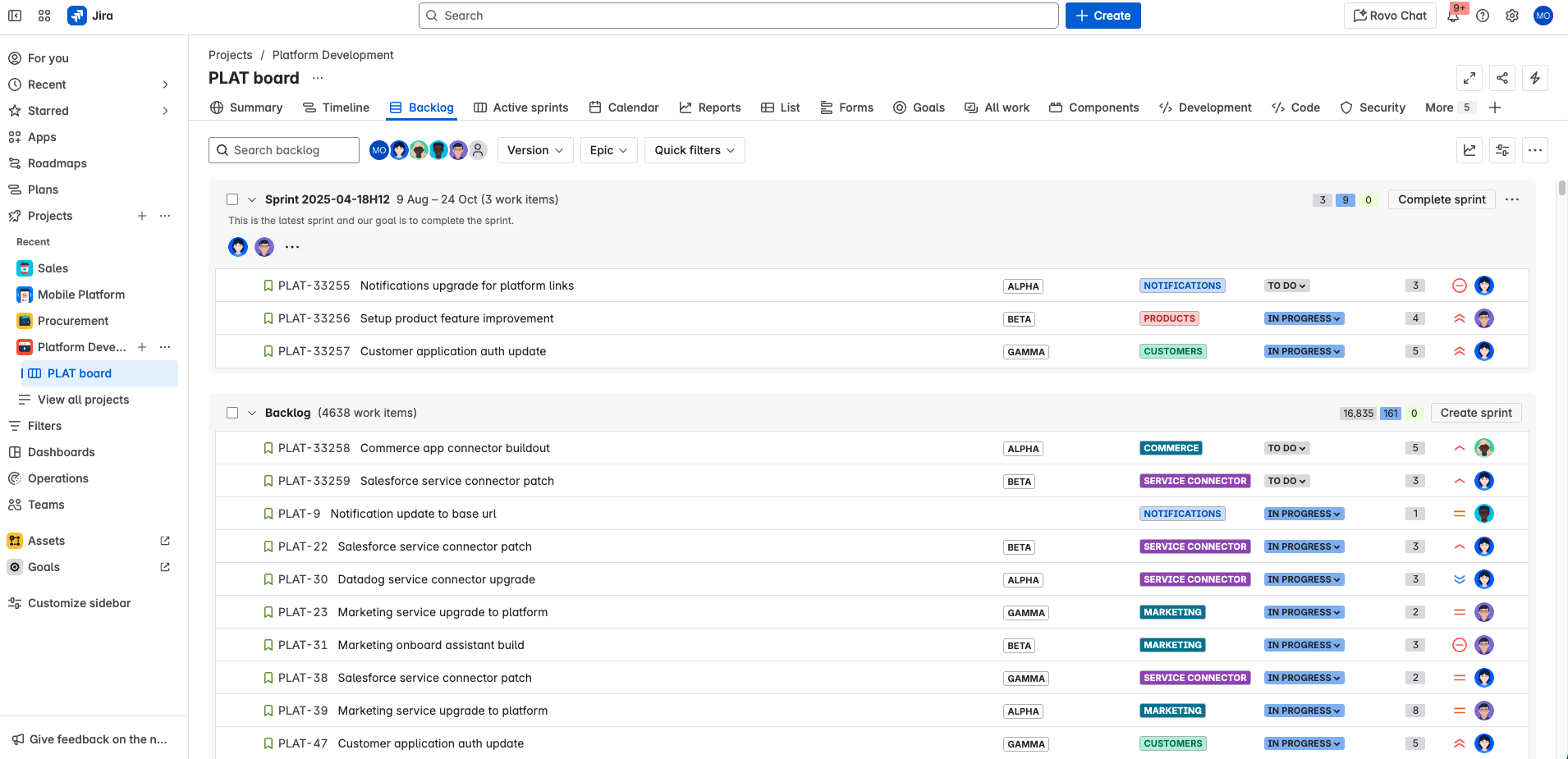プロジェクト・マネージャーとは
A project manager, or PM, coordinates the elements of a project, aiming for timely completion within budget and with high standards. They’re the central figure connecting project goals with the collective efforts of their team and help navigate obstacles to guide projects to their goals. They gather necessary resources, unite team members, and work on continuous improvement.
Becoming a certified project manager can significantly enhance career prospects and provide essential knowledge of project management best practices. Project managers connect the day-to-day work with the bigger picture, supporting the company's border objectives.
このガイドでは、PM の重要な責任、主要なスキル、そして最善の戦略に焦点を当て、その役割について説明します。また、Jira のようなプラットフォームによって、PM がプロジェクトのライフサイクル全体でチームのコラボレーションとコミュニケーションをどのように強化できるかについても詳しく見ていきます。
Key takeaways
- A project manager (PM) is a central figure who coordinates all elements of a project, from planning and team coordination to risk management and client communication, aiming for timely, on-budget completion.
- Effective project managers possess a crucial blend of soft skills, such as communication, adaptability, and leadership, and hard skills in planning, budget oversight, and quality control.
- The job outlook for project managers is excellent. Growing demand across diverse industries makes it a promising career path for those who can drive projects to successful outcomes.
- Platforms like Jira revolutionize project management by providing project managers with a centralized hub to plan, track, and manage projects, enhancing collaboration and streamlining workflows through features like Timelines, Lists, and Boards.

プロジェクト・マネージャーの責任
PM は、さまざまな中核的責任を果たしながら、障害や変化を乗り越えてプロジェクトを主導します。これらの各分野を熟知していると、チーム メンバーと関係者の両方の観点から、よりスムーズなエクスペリエンスに役立ちます。
プロジェクト管理の知識体系 (PMBOK ガイド) は、プロジェクト管理における重要なナレッジ分野とベスト プラクティスを概説し、PMP (プロジェクト管理プロフェッショナル) 認定などの資格の取得を目指すプロフェッショナル向けの基礎的なリソースとして役立ちます。
- プロジェクト計画: PM は、プロジェクトのスコープ、目標、目的を明確に定義して、計画プロセスを開始します。タスク、リソース、タイムライン、成果物を概説する詳細な計画を立て、プロジェクト実行の強固な基盤を築きます。
- チームの調整: プロジェクト マネージャーは、メンバーのスキルと経験に基づいてタスクを割り当て、プロジェクト チームを編成して指揮します。コラボレーションを促進し、対立を解決し、効果的なチーム ミーティングを主導することで、チームの取り組みに焦点を当て、チームを団結させます。
- リスク管理:PM は潜在的なリスクを早期に特定し、起こり得る影響を分析し、緩和戦略を策定します。この積極的なアプローチにより、プロジェクトのスケジュール、品質、予算への影響を最小限に抑えます。
- 予算の監視:PM はコストを見積もり、予算を立て、支出を追跡し、財政的効率を達成しながらプロジェクトを財政の範囲内に収めるように必要に応じて調整します。
- クライアントとのコミュニケーション: クライアントや関係者とのオープンで透明性の高いコミュニケーションを維持します。PM は最新情報を提供し、問い合わせに対応し、フィードバックを活用して、クライアントの期待に応える、または期待を超えるように対応します。
- 品質基準の維持: PM は品質管理プロセスを実施して、成果物が合意された基準を満たし、クライアントの要件を満たすことを確認します。これがプロジェクトの完全性を維持するのに役立ちます。
プロジェクト・マネージャーのスキル
どのようなプロジェクトでも、成功するかどうかは PM が持つソフト スキルとハード スキルの独自の組み合わせに大きく依存しています。PMP (プロジェクト管理プロフェッショナル) として認定されると、プロジェクト管理職としてのキャリアの将来性が大幅に向上し、昇給の可能性も生まれます。PM がその役割において発揮しなければならない重要なソフト スキルの一部を次に紹介します。
- コミュニケーション: PM はプロジェクトの目標、最新情報、フィードバックをすべての関係者に伝えるために、口頭と書面でのコミュニケーション スキルを身につける必要があります。これにより、プロジェクトのライフサイクル全体にわたる連携とコラボレーションが促進されます。
- 適応性: PM はプロジェクトの変化や予期しない課題に柔軟に対応する必要があります。プロジェクトを進めるために戦略や計画を調整できなければなりません。
- 問題解決:PM は決断力を持って問題に取り組む必要があります。批判的思考を使って問題を分析し、解決策を考案し、それらを効果的に適用します。これにより、プロジェクトの進捗と成果への影響を最小限に抑えます。
- チーム リーダーシップ: PM は、チーム メンバーを導き、能力開発をサポートし、協力的な環境を育んで刺激を与え、士気を高めます。
- 組織統率力: 優れた組織統率力により、PM は複数のタスクや優先事項のバランスを取ることができます。スケジュールを立て、リソースを割り当て、プロジェクトのタイムラインを監視し、チームを巧みに成功に導きます。
プロジェクト マネージャーのキャリア パス
プロジェクト マネージャーはその業種、経験、スキルに応じて、さまざまなキャリア パスを選ぶことができます。プロジェクト マネージャーの一般的なキャリア パスには、次のようなものがあります。
- シニア プロジェクト マネージャー: シニア プロジェクト マネージャーとして、複数のプロジェクトやチームを監督しながら、計画や意思決定でより戦略的な役割を担います。このポジションには、幅広いプロジェクト管理の経験と、複雑なプロジェクトを効果的に管理する能力が求められます。
- プログラム マネージャー: プログラム マネージャーは、関連するプロジェクトを担当し、組織の目的や目標との整合性を確保します。この役割では、長期的な戦略の成果を達成するため、プロジェクト マネージャーとリソースを調整することもあります。
- ポートフォリオ マネージャー: ポートフォリオ マネージャーは、プロジェクトとプログラムを監督し、会社の戦略目標との整合性を確保します。この役割では、リソース割り当てを深く理解し、競合する優先事項のバランスをとる必要があります。
- PMO (プロジェクト管理オフィス) マネージャー: PMO マネージャーは、プロジェクト管理オフィスを設立してこれを管理し、組織内のプロジェクト マネージャーにサポートとガイダンスを提供します。この役割では、プロジェクト管理の基準、手法、ベスト プラクティスの開発も行います。
- プロジェクト管理コンサルタント: コンサルタントは、コンサルティングによってプロジェクト管理の専門知識を組織に提供します。この役割では、さまざまなクライアントと協力して、プロジェクト管理のプロセスと成果を改善するためのソリューションを提供できます。
プロジェクト管理トレーナー: トレーナーは、個人や組織にプロジェクト管理のスキルと知識の教育を行います。この役割には、トレーニング プログラムの開発、ワークショップの実施など、人々のプロジェクト管理の資格取得をサポートすることも含まれます。
それぞれのキャリア パスには成長と発展のための独自の機会があり、プロジェクト マネージャーはそのプロジェクト管理スキルをさまざまな方法で発揮できるようになります。
プロジェクト マネージャーの給与とキャリアの将来性
プロジェクト マネージャーの給与は、業界、地域、経験、スキルによって異なります。PMI (プロジェクト マネジメント協会) によると、米国のプロジェクト マネージャーの給与の中央値は年間約 115,000 ドルです。ただし、実際の給与は業務や勤務地に応じて、年間 60,000 ドルから 200,000 ドルを超えるなどさまざまです。
プロジェクト マネージャーのキャリアの将来性は高く、PMI では、今後 10 年間でプロジェクト管理のプロフェッショナルに対する需要が大幅に増加すると予測されています。PMI の推定では、2030 年までに、毎年 230 万件を超える新しいプロジェクトに関する役職を補充する必要が生じるとされています。この需要の高まりは、プロジェクト管理スキルの重要性、およびこの分野でのキャリアの追求による価値を浮き彫りにしています。
適切なプロジェクト管理の知識と経験があれば、プロジェクト マネージャーはさまざまな業界で有利な機会が得られ、有望なキャリアの選択肢を増やせます。
プロジェクト マネージャーとしてのストレス管理
プロジェクト マネージャーは、厳しい締め切りと高いプレッシャーの下で仕事をすることが多く、ストレスを抱え、燃え尽き症候群に陥りやすくなります。そのため、幸福度と効率を促す戦略を採用することが不可欠になります。プロジェクト マネージャーとしてストレスに対処するためのヒントをいくつかご紹介します。
- タスクに優先順位を付ける: まず、最も重要なタスクに集中して、迅速にプロジェクトの重要な要素に取り組みます。プロジェクトをより効果的に管理できるため、手に負えないという感覚が軽減されます。
- タスクを委任する: スキルと専門知識に基づいてチーム メンバーにタスクを割り当てます。委任によってワークロードを軽減し、チームを強化し、コラボレーションを促します。
- 定期的に休憩を取る: 休憩を毎日のルーチンに取り入れて英気を養い、生産性を維持します。長期にわたってパフォーマンスを維持するには、セルフケアの実践が不可欠です。
- 効率よくコミュニケーションを取る: プロジェクト チームや関係者とのオープンなコミュニケーションを維持します。明確なコミュニケーションは、課題を早期に特定して対処し、その拡大を防ぐのに役立ちます。
- プロジェクト管理ソフトウェアを使用する: プロジェクト管理ソフトウェアを活用してタスクを合理化し、プロジェクトの進捗を追跡し、効率を向上させます。Jira によって整理された状態が保たれ、全員が同じ認識を持てるようになります。
プロジェクトの進捗を監視・管理する: プロジェクトの進捗を監視して、潜在的な課題を早期に特定します。リスク管理計画によって、潜在的なリスクを軽減し、プロジェクトを順調に進められます。
このようなヒントに従えば、プロジェクトを成功させ、キャリア目標を達成しながら、ストレスを軽減し、幸福度を高められます。プロジェクト マネージャーとして成功し、個人として、また職業人として成長するには、効果的なストレス管理が不可欠です。
プロジェクト・マネージャーのベスト・プラクティス
優れた PM は、プロジェクトを通して一貫してベスト・プラクティスを適用することに取り組んでいます。優れたプロジェクト管理はスキル、戦略、そして継続的な改善の組み合わせから生まれることを知っています。ここでは、主要なベスト・プラクティスをいくつかご紹介します。
明確なコミュニケーションを最優先する
明確なコミュニケーションにより、全員が同じ方向を目指し、透明性と効率性をチームのワークフローの中心に据えます。意見、進捗の最新情報、懸念事項のオープンな交換を奨励することは、チームが障害に正面から取り組み、プロジェクトを前進させるのに役立ちます。
効果的なプロジェクト計画の立案
優れた構成のプロジェクト計画には、次の重要な要素が含まれています。
- スコープ:プロジェクトのスコープを明確に定義します。これにより、スコープ・クリープを防ぎ、全員がプロジェクトの境界を理解できるようになります。
- 目的と目標:プロジェクトで達成することを設定します。目標は、具体的、測定可能、達成可能で、関連性のある、期限が明確なものにします。
- マイルストーンとタイムライン:重要なマイルストーンを特定し、プロジェクトの各フェーズを完了すべき時期を示すタイムラインを作成します。
- リソース: 必要なリソース (人材、予算、技術) を明確にし、効果的に割り当てます。これには、役割と責任の特定も含まれます。
- リスク管理:潜在的なリスクを予測し、それらに対処する方法を戦略化します。これにより、不確実性管理への積極的なアプローチが促進されます。
- コミュニケーション計画:プロジェクト・チーム内や関係者とのコミュニケーションの対応方法を概説します。これには、頻度、方法、重要なポイントが含まれます。
プロジェクト管理ソフトウェアの使用
専用のプロジェクト管理ソフトウェアを使用することで、PM は自身の役割を果たすことができます。
プロジェクト管理ソフトウェアは、計画、タスク、リソースなど、プロジェクトに関連するすべてのものを一元管理するハブです。これにより、プロジェクトの概説、タスクの分配、締め切りの追跡が簡単になります。全員が最新情報を把握できるので、混乱を減らし、チームワークを強化します。
プロジェクト管理ソフトウェアは、チームのコミュニケーション方法も改善します。ツールを使用すれば、よりスムーズな更新、共同での問題解決、コメント、ファイル共有、同時編集など効率的な調整が可能になります。
Jira は、コラボレーションを強化し、ワークフローを合理化するために設計された一連の強力なツールを提供し、プロジェクト管理に革命をもたらします。PM はプロジェクトのあらゆる側面を計画、追跡、管理するための一元化されたハブを利用し、チームの連携と効率を維持できます。
Jira のタイムライン、リスト、ボードによって、プロジェクト マネージャーはタスクを視覚的に整理し、進捗を監視し、情報に基づいた意思決定を行えるようになります。タイムラインを使用すれば、主要なマイルストーンと依存関係を綿密に計画し、プロジェクトを順調に進められます。リストはタスクと責任に優先順位を付けるための簡単な方法であり、一方、ボードはアジャイルなコラボレーションを可能にし、ワークフローを透明性が高く適応性に優れたものにします。
次のタイムライン ビューをご確認ください。
チームを強化する
触発され、権限を与えられたチームは、生産性を高めるだけでなく、プロジェクトの成功の原動力にもなります。有能な PM は、次のようなさまざまなチーム管理戦略を通じて、前向きな職場環境を作ります。
- 各チーム メンバーが自分の役割、期待事項、そして自分の仕事がプロジェクトの成功にどのように貢献しているかを理解していることを確認する。
- チーム メンバーが自分の仕事について意思決定を行う自由を与える。これが信頼を築き、革新を促します。
- チーム メンバーがスキルを磨き、プロとして成長する機会を提供する。これには、トレーニング、ワークショップ、またはプロジェクト内での新しい課題への取り組みなどが含まれます。
- 個人としてもチームとしても、定期的に業績を認め、称える。
チーム メンバーが自分のアイデア、懸念、フィードバックを気軽に共有できる環境を作る。
さまざまな業界でプロジェクト マネージャーの仕事に対する需要が高まっており、このような職務に対して求められるさまざまなスキル セットに注目が集まっています。
Jira を使用した効果的なプロジェクト管理
Jira はコラボレーション、効率性、説明責任を促進するツールを提供することで、プロジェクト管理を合理化します。これはチームがプロジェクトをリアルタイムで計画、追跡、管理するための包括的なプラットフォームであり、プロジェクトのライフサイクル全体を通して整合性と透明性を確保します。
タイムライン、リスト、ボードなどの Jira の優れた機能は、プロジェクト管理を簡素化し、チームの成功を促すよう設計されています。
- タイムライン: プロジェクトのスケジュールと依存関係を一目で把握できるよう視覚化します。タイムラインでは、主要なマイルストーンと進捗ポイントをマッピングすることによって、PM は予定どおりに進め、重要な締め切りに間に合わせることができます。
- リスト: カスタマイズ可能なリストでタスクを整理して、チームの優先事項と責任の概要を明確にします。
- ボード: アジャイル、スクラム、またはカンバン ワークフローに適応するボードと動的にコラボレーションして、プロジェクトの更新とタスクの追跡をシームレスに行います。
To support these responsibilities, project management software like Jira enables project managers to plan, assign tasks, track time, and monitor real-time progress. These tools streamline resource allocation, budgeting, and communication strategies, making it easier to manage projects of any size.
Effective project management with Jira
Jira streamlines project management by offering tools that foster collaboration, efficiency, and accountability. It is a comprehensive platform for teams to plan, track, and manage their projects in real-time, ensuring alignment and transparency throughout the project life cycle.
Jira's standout features, such as Timelines, Lists, and Boards, are designed to simplify project management and drive team success:
- Timelines: Visualize your project schedule and dependencies at a glance. By mapping out key milestones and progress points, Timelines help PMs stay on track and meet critical deadlines.
- Lists: Keep tasks organized with customizable Lists, which provide an overview of the team's priorities and responsibilities.
- Boards: Collaborate dynamically with boards that adapt to agile, Scrum, or Kanban workflows, making project updates and task tracking seamless.
プロジェクト・マネージャー:よくある質問
プロジェクト・マネージャーの日常業務は何ですか?
PM はプロジェクトの進捗の監視、関係者との課題に関する議論、発生した課題への対処、計画の調整など、プロジェクトを目的に沿って順調に進めるための日々のタスクを管理します。
プロジェクト管理の手法とは何ですか?
プロジェクト管理の手法は、プロジェクトのライフ サイクルを導くための青写真です。アジャイルとスクラムは、テンポの速い反復型のプロジェクトに最適です。ウォーターフォールとリーンは、順序が決まっているプロジェクトや、無駄を最小限に抑えることに重点を置いたプロジェクトに適しています。
プロジェクト・マネージャーはなぜ重要なのですか?
プロジェクトの計画と実行の間の架け橋として、プロジェクト マネージャーは不可欠な存在です。PM の中核的な役割は、プロジェクトが締め切りに間に合い、予算内に収まり、品質基準を遵守するようにすることです。タイムラインとリソースの管理に関するその専門知識は、誤解やスコープ クリープを防ぎます。
プログラム・マネージャーとプロジェクト・マネージャーの違いは何ですか?
プログラム・マネージャーは、長期的な目標と会社の目的に対する全体的な影響に焦点を当てて、関連するプロジェクトのグループを監督します。プロジェクト・マネージャーは、1 つのプロジェクトの日常業務を担当します。特定の締め切り、予算、スコープを守ることに集中しています。